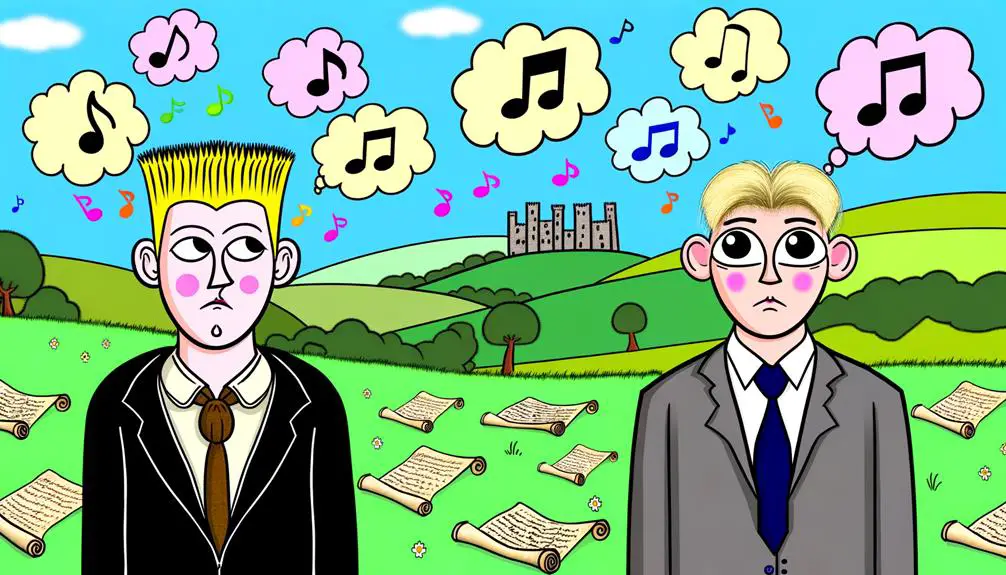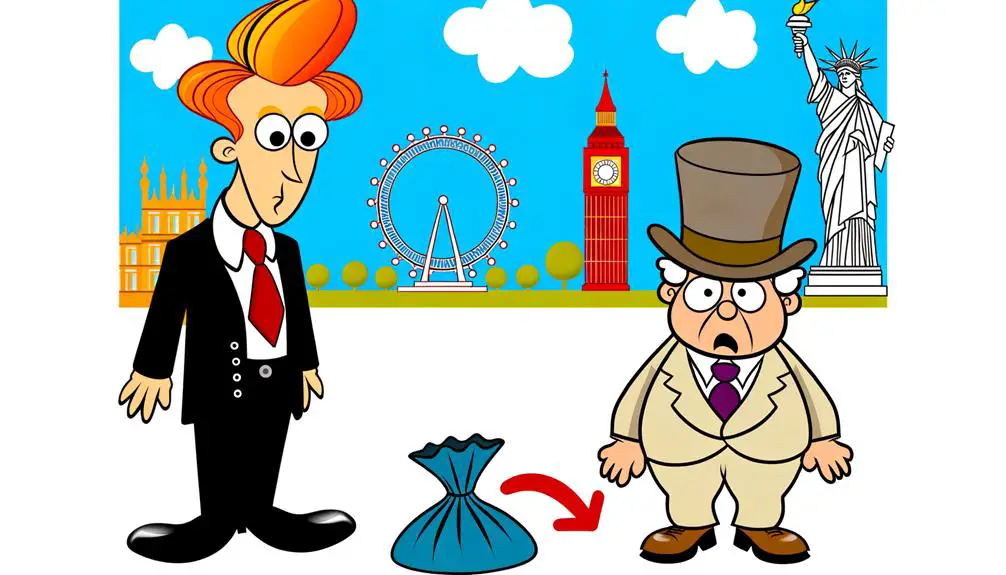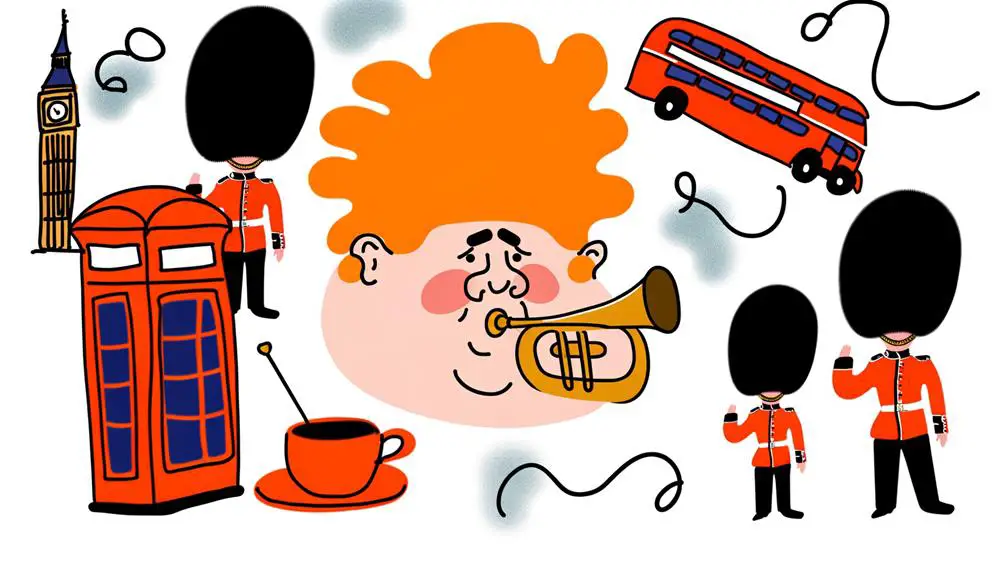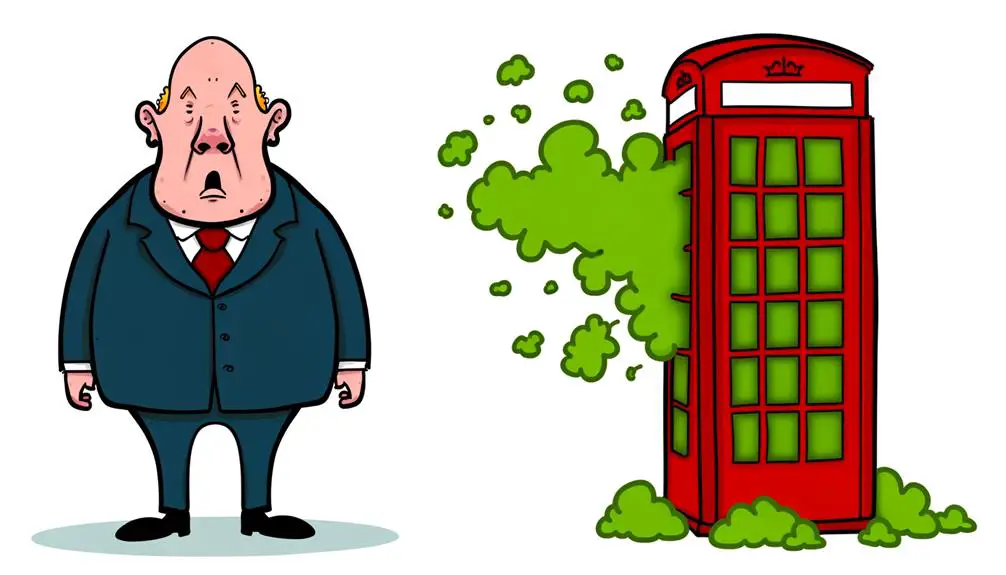So, you've stumbled upon the British gem of a word, 'trump,' and no, it's not about politics. Over in Blighty, when someone drops a 'trump', they're not winning elections; they're releasing their very own air biscuit, a fart, if you will. This linguistic treat comes from the old French word 'trumpet' – quite the imagery for tooting your own horn, right? It's a slice of British humor that turns an everyday occurrence into a cheeky chuckle. Brit slang is a labyrinth of wit and wonder, with 'trump' being the perfect exhibit. Who knew flatulence could bridge cultures? Stick around, there's more where that came from.
The Origins of "Trump"

You mightn't believe it, but 'trump' has been cutting the cheese in British slang long before it became a household name in American politics. Let's explore the nitty-gritty, shall we?
The term 'trump' has its roots dug deep into the medieval muck, originating from the old French word 'trumpet', meaning to blow a horn – or in this case, to toot one's own. But how did we go from heralding knights to heralding… well, you know?
The trump card etymology takes a cheeky turn in the Middle Ages. Imagine this: a group of jesters around a table, playing cards, when suddenly, one plays the 'trump' card. Now, in the game, this is a winning move. But, let's be real, in the context of medieval humor, it's a not-so-subtle nod to letting one rip. That's right, the ultimate power move was synonymous with the universal sound of flatulence.
American Vs British English
Diving into the linguistic pool, it's clear that American and British English are siblings who've decided to dress differently for the family photo. While they share the same roots, the Atlantic Ocean has brewed a storm of dialect differences and pronunciation peculiarities that make each stand out in their own quirky ways.
Consider these gems:
- Aluminum vs Aluminium: Americans dropped a syllable like it was hot, while Brits cling to it like a cherished heirloom.
- Zee vs Zed: When it comes to the end of the alphabet, Americans zip through with a zippy 'zee', while Brits prefer the more dignified 'zed'.
- Herb with a silent 'H': Americans treat the 'H' in 'herb' like it's on a witness protection program, while Brits pronounce it proudly, giving the 'H' its moment in the sun.
- Truck vs Lorry: You might be picturing a rugged vehicle, but depending on which side of the pond you're on, you'll either be loading your 'truck' or hitching a ride in a 'lorry'.
Linguistic Evolution and Humor

Let's face it, the evolution of language isn't just about stiff grammar rules; it's also how a simple word like 'trump' can cheekily mean a fart in British English, sparking laughs and raised eyebrows. You see, diving into linguistic evolution is a bit like unearthing a time capsule filled with jokes; it's an exploration of how words shift and slide into hilarity, often without even trying. The term 'trump' as a reference to passing gas is a prime example of how language can capture the essence of humor analysis, turning everyday conversations into unexpected comedy sketches.
Now, let's talk cultural perceptions, because they're the bread and butter of humor. They shape what we find funny and why. In the UK, 'trump' carries a playful edge, a nudge-and-wink to the listener that you're in on the joke together. It's a linguistic wink that bridges generations, showcasing the power of words to unite us in laughter. This humorous twist on language not only showcases the fluidity of English but also highlights how cultural nuances breathe life into the words we choose, making the mundane, like a simple fart, something worth a chuckle.
"Trump" in British Culture
You've got to admit, the word 'Trump' brings a smirk to the Brits, not just for politics but for its cheekier, gassier connotations.
Now, ponder how the public snickers when they hear 'Trump', blending humor with a dash of language evolution on the side.
It's a linguistic toot that's become a cultural giggle, evolving faster than a whiff in the wind.
"Trump": Humorous Etymology
If you're ever across the pond and hear someone chuckle at the mention of 'trump,' they're probably not talking politics – it's British for a cheeky fart. Delving into the humorous etymology of 'trump' offers a whiff of both fart history and slang psychology. Here's why it's a gas:
- Historical Hilarity: It's been tickling the British funny bone for centuries, proving some jokes never get old.
- Slang Evolution: Shows how language shifts from the stately to the snicker-worthy.
- Psychological Relief: Fart jokes provide a universal outlet for breaking tension.
- Cultural Quirk: Highlights the British love for underdog humor and the delight in elevating the everyday to comedy.
Public Reactions to "Trump"
When Brits hear the word 'trump,' many can't help but let out a snigger, instantly associating it with a bit more than just political banter. You see, in the UK, 'trump' carries a whiff of jest that's hard to ignore, especially when the discussion veers into the territories of political implications and social etiquette.
| Context | Reaction |
|---|---|
| Formal Gatherings | Awkward Chuckles |
| Political Debates | Sly Grins |
| Social Media | Endless Memes |
| Pubs | Boisterous Laughs |
It's a linguistic quirk that serves as comic relief amid heated discussions. Maneuvering this peculiar terrain requires a keen sense of timing and a dash of daring. So, next time 'trump' pops up, you're armed with more than just knowledge; you've got a ticket to the comedy show.
Language Evolution and "Trump"
Diving into the linguistic whirlpool, 'trump' in British culture has evolved from a simple giggle to a full-blown cultural phenomenon, blending humor with a dash of rebellion. This delightful twist showcases dialect diversity and digs into the rich soil of slang origins, proving language is as unpredictable as a whoopee cushion on a throne.
- *It's a linguistic rebellion*: Embracing 'trump' shakes up the status quo.
- *Dialect diversity on display*: From London lads to Yorkshire folks, everyone's in on the joke.
- *Slang origins, unmasked*: A peek into how words flip from mundane to marvellously cheeky.
- *Humor meets history*: A tale of how one word can capture a nation's playful defiance.
Other Funny British Slang
You've had a giggle over 'trump' meaning fart, but hold onto your hats because British slang's about to take you on a wilder ride.
From the cheeky lure of a Nandos with the lads to the mystifying simplicity of 'Bob's your uncle,' you're not just lost in translation—you're on a linguistic rollercoaster.
Let's crack on and uncover the hilarity stitched into the very fabric of British banter, shall we?
Cheeky Nandos Explained
Let's get started with 'Cheeky Nandos,' a term that'll have you smiling as you immerse yourself in the saucy depths of British slang. When Brits say they're off for a 'Cheeky Nandos,' they're not just talking about grabbing a bite; they're diving into a cultural phenomenon wrapped in peri peri chicken goodness.
- It's cheeky because it's impromptu or indulgent, a treat that's maybe not entirely deserved.
- It's all about the banter with mates, an experience rather than just a meal.
- Nando's sauce becomes a symbol of this cheeky escapade, a tangy badge of honor.
- Peri peri chicken isn't just food; it's the centerpiece of this cheeky adventure, shared stories, and laughter.
Bobs Your Uncle
Exploring through the labyrinth of British slang, you'll stumble upon 'Bob's your uncle' – a phrase that packs more punch than a cuppa with the Queen. It's the British quip that wraps up any trickier explanation with a neat bow.
Want to hack the system? Just flick this, press that, and Bob's your uncle! No, not your actual Uncle Bob – we're not dragging familial phrases into the murky waters of literal interpretation here. This cheeky bit of lingo is the UK's way of saying “and there you have it” without the yawn.
It's the verbal equivalent of pulling a rabbit out of a hat. So next time you crack the code, remember, it's as simple as pie – or should we say, as easy as saying Bob's your uncle!
Lost in Translation
After mastering 'Bob's your uncle,' it's time to tackle more British slang that'll have you sounding like a true local, or at least, less of an outsider. Exploring through the labyrinth of cultural perceptions and translation challenges, you'll find some gems that might leave you chuckling or utterly confused. Here's a sneak peek:
- Gobsmacked: Astonished, not smacked by an actual gob.
- Knees up: A party, not a medical condition.
- Dog's Bollocks: Surprisingly, it means something excellent.
- Chuffed: Pleased, not chafed.
These phrases are the tip of the iceberg in the quirky world of British slang. They showcase the playful yet bewildering landscape of language, where cultural perceptions and translation challenges collide, often hilariously.
Language Misunderstandings
Diving headfirst into the world of language misunderstandings, you'll find that 'Trump' doesn't always signal politics in the UK—it's their cheeky way of saying you've passed gas. Imagine the confusion, the raised eyebrows, the half-suppressed giggles when an American, brimming with political fervor, launches into a tirade about Trump, only to be met with snickers from the British crowd. It's a classic case of when cultural sensitivity and maneuvering challenges collide head-on, leaving everyone a bit red-faced.
This linguistic quirk highlights the slippery slope of navigating language in a global context. What's considered a harmless bodily function in one culture can be a political hot potato in another. It's a stark reminder that words carry weight, and in the absence of cultural sensitivity, you're just one misstep away from turning a serious discussion into a comedy sketch.
Influence on Pop Culture

Now, let's consider how this linguistic quirk farts its way into pop culture, leaving audiences both bemused and enlightened. Suddenly, the word 'trump' isn't just a surname or a card game term; it's a cheeky, irreverent slice of British humor that's infiltrated conversations worldwide. And, oh, how pop culture loves a good fart joke.
Here's how this gassy gem is making waves:
- Celebrity Endorsements: Imagine your favorite celeb on late-night TV, trying not to giggle while explaining British slang. The clip goes viral before the next commercial break.
- Social Media Memes: Memes are the language of the internet, and a well-timed 'trump' meme? Social media gold, my friends. It's the kind of content that gets shared, liked, and retweeted into oblivion.
- Comedy Sketches: Comedy writers are having a field day, crafting sketches where the punchline is a sophisticated play on 'trump' meanings. Audiences can't get enough.
- Merchandise: Yes, there's merchandise. T-shirts, mugs, and even whoopee cushions that cheekily nod to the dual meaning. It's irreverent consumerism at its finest.
In the whirlwind of pop culture, 'trump' has become more than a word; it's a playful poke at language itself, and we're all in on the joke.
Future of Slang Words
Every generation cooks up its own slang stew, but what's simmering for tomorrow's linguistic feast? You've got to wonder, with the world shrinking faster than your favorite jeans in a hot wash, where's slang headed? Slang globalization is on the rise, folks. Picture this: a word born in the bustling streets of Tokyo, making its way to the laid-back cafes of Paris, all while you're still trying to figure out what 'on fleek' means.
And let's not forget digital slang, the cyber offspring of our tech-obsessed society. It's evolving quicker than you can double-tap a like on Instagram. Before you know it, emojis mightn't just complement text but replace entire phrases. Imagine sending a string of icons and calling it a heartfelt conversation.
Frequently Asked Questions
How Do British People React When Hearing the Word "Trump" in the Context of American Politics?
When you hear "Trump" in political discussions, you're diving into a whirlpool of cultural perceptions. It's a laugh or cringe moment, depending on who you're chatting with. Politics never sounded so…gassy.
Are There Any Notable Instances Where the Use of the Word "Trump" Has Led to Misunderstandings Between British and American Speakers in Formal Settings?
Yes, there've been snickers in formal settings, where 'trump' caused cultural confusions and messed with diplomatic nuances. Imagine discussing serious politics, and it sounds like you're chatting about farts. Awkward, but hilarious, right?
Have Any British Comedians or Public Figures Commented on the Dual Meaning of "Trump" During the Tenure of Donald Trump's Presidency?
Yes, British comedians and public figures have riffed on Trump's name, sparking social media trends and inspiring Trump-themed merchandise. Their wit turned his tenure into a goldmine for jokes that both bewildered and amused audiences.
How Do Language Learning Resources for English as a Second Language Address the Different Meanings of "Trump" in British and American English?
In your quest to master English, you'll find that textbooks tiptoe around the Trump etymology, barely whispering about its cultural nuances. They'd rather you not giggle in class, but hey, language is a hoot!
Is There Evidence of the Word "Trump" Being Used in British Literature or Historical Documents Prior to Its Association With Flatulence?
Yes, you'll find 'trump' in old texts, its etymology origin predating any snickers about farts. This linguistic evolution shows how words shift from serious to cheeky, proving language's fantastic journey through history.
Conclusion
So, you've journeyed through the linguistic labyrinth, from the cheeky origins of 'trump' to its explosive presence in pop culture.
You've waded through the murky waters of British slang, chuckling at the mischiefs of language.
Now, as we stand on the edge, peering into the future of slang, remember: today's 'trump' might be tomorrow's treasure, or perhaps another humorous guff in the annals of language.
Keep your ears peeled, your mind open, and maybe, just maybe, avoid letting out a 'trump' in polite company.







